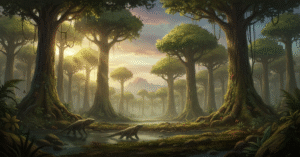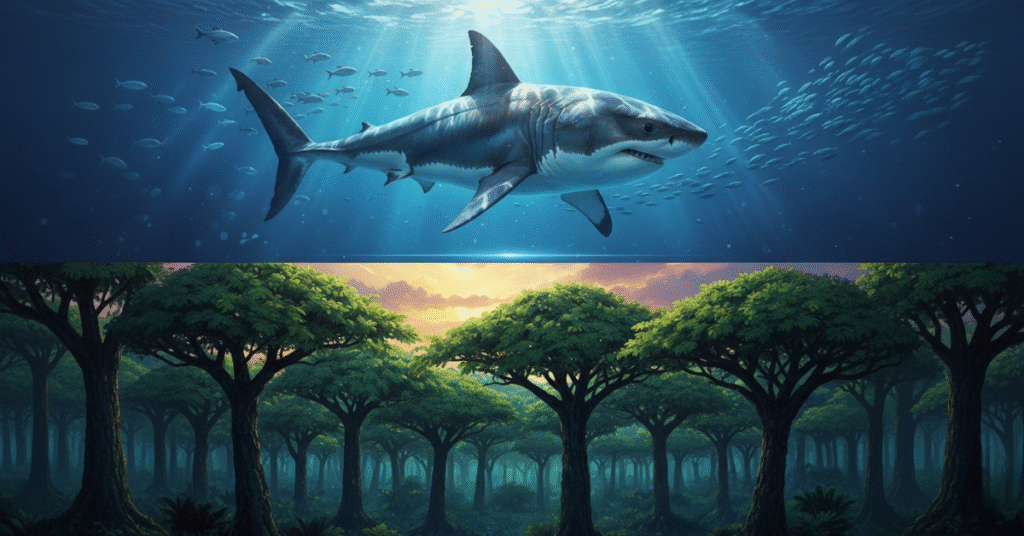Sharks older than trees? Have you ever stopped to think about what the oldest living things on Earth are? Most of us would immediately picture a massive, ancient oak tree, its roots deep in the soil, silently watching centuries pass. I certainly did. But what if I told you that one of the fiercest predators in the ocean, the shark, was already swimming in the world’s waters long before the first forest ever took root on land? The sheer scale of this time difference is what makes the fact that sharks older than trees so completely mind-boggling. It reshapes our entire perspective on the planet’s history.
This isn’t a mere fun fact; it’s a testament to millions of years of evolution and survival. To truly appreciate this, we need to look at the geological timeline.
Sharks: Rulers of the Deep for 450 Million Years

The oldest verified fossil evidence of a creature we can confidently call a shark dates back over 450 million years ago. To put that number into perspective, that places their origin in the Ordovician Period. At that time, complex life was mostly confined to the oceans, and the land was a barren, rocky, and mostly lifeless expanse.
Imagine the Earth then: The air was different, the continents were merged into supercontinents, and there wasn’t a single leaf or branch anywhere. Yet, in the deep blue, the ancestors of today’s Great Whites and Hammerheads were already perfecting the art of survival. They have weathered all five of the planet’s major mass extinction events—cataclysms that wiped out up to 96% of all species. They are, without a doubt, nature’s most successful endurance athletes.
Trees: A Relatively New Arrival (350 Million Years Ago)

Now, let’s talk about trees. When we say ‘trees,’ we are talking about complex, woody plants with true roots, trunks, and leaves that form a canopy. The earliest undisputed fossils of these true trees, like the Archaeopteris, show up around 350 million years ago during the late Devonian Period.
The appearance of these first forests was a world-changing event. They completely reshaped the planet’s atmosphere, creating the very air we breathe today and stabilizing the soil. They are the foundation of all terrestrial life as we know it.
But here is the breathtaking realization: the shark lineage had already been thriving for a stunning 100 million years before the first tree even cast its shadow on Earth! When the first forests were finally growing, sharks were already an ancient, established species. This fact that sharks older than trees highlights the incredible antiquity of the ocean’s ecosystem.
The Secret to Shark Survival: Beyond the Teeth
What is the secret behind this unparalleled longevity? It’s more than just a fierce set of teeth.
- Cartilage Skeleton: Sharks have a skeleton made of cartilage, which is lighter and more flexible than bone. This structure requires less energy and allows them to swim more efficiently, a critical advantage for long-term survival in an ever-changing environment.
- Streamlined Design: Their body shape is a masterwork of natural engineering. It’s been so effective that it has barely needed to change over 450 million years. Why fix something that isn’t broken?
- Metabolic Efficiency: They are built to survive periods of famine. Their biology allows them to be highly opportunistic feeders, conserving energy when prey is scarce.
When I first learned that sharks older than trees, it truly changed the way I see the ocean. It’s not just water; it’s a timeless realm ruled by creatures that are a living link to the very dawn of complex life. This is why preserving them isn’t just about saving an animal; it’s about protecting one of Earth’s original success stories.
The next time you walk through a forest, pause and consider the silent, ancient legacy. Then, remember that the creatures swimming deep beneath the waves predate every single branch, root, and leaf around you. The ocean holds secrets we are only beginning to uncover.






